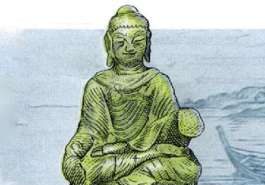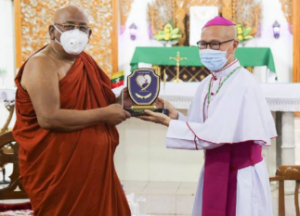
“For these are all our children, we will all profit by or pay for what they become.”
― James Baldwin
In 1966, Thich Nhat Hanh visited Harvard to tell Americans that their war in Vietnam must stop. He spoke softly, but with clarity, telling the audience that if Americans stopped bombing and began building, the national sentiment would turn strongly in their favor. On the other hand, with each new attack by the Americans that killed and maimed innocent Vietnamese, a few more villagers would join the Viet Cong, and the broad anti-imperialist sentiment would grow stronger.
“The war is not only damaging to human life and property, but also to our morality,” Nhat Hanh told those gathered. “We rely on the intellectual and religious community in the U.S. to understand our suffering and help us out of a desperate situation.” (The Harvard Crimson)
Today we see another military superpower bombing and killing civilians, turning local—and perhaps global—sentiment against them.
In recent weeks, the world has once again borne witness to the heart-wrenching violence that has engulfed Israel and Palestine, a seemingly unending cycle of suffering and loss that touches the lives of countless people. The anguish, pain, and fear on both sides of the conflict underscore the pressing need for a peaceful path forward, rooted in compassion and the recognition of the universal dignity of every human being.
Before delving into the specifics of the ongoing conflict, we must acknowledge the immense suffering experienced by individuals and communities on both sides of the Gaza-Israel border. The harrowing images of destruction, the cries of bereaved parents, and the despair of innocent children remind us of the urgent need for a just and lasting resolution.
On 7 October, fighters from Hamas and other Palestinian militant groups launched a surprise assault into Israel, firing thousands of rockets, raiding border posts, and pouring into settlements just kilometers from Gaza. Militants killed at least 1,400 Israelis, including women, children, and the elderly as well as 260 people who were killed at a music festival, the deadliest single attack in the history of the State of Israel.
In its quick response, Israeli Defense Forces (IDF) pushed back or killed all of the militants who had entered Israel and then began a massive arial bombardment of Gaza, the likes of which has never been seen in the territory. According to the UN, Israel has destroyed nearly a quarter of the northern Gaza Strip, killing over 4,000 Palestinians, mostly women and children. (ReliefWeb)
As Buddhists, we are guided by the teachings of compassion, non-violence, and the fundamental interconnectedness of all sentient beings. In this spirit, we must condemn the Hamas-led violence which set off this latest rise in violence. We condemn antisemitism in all of its forms. And we also must condemn the excessive retaliation from the IDF that has cost so many innocent lives. We condemn Islamophobia and collective punishment.
Human rights organizations, including the United Nations, have consistently reported on the violations, abuses, and the devastating consequences of the violence. These findings underscore the necessity of prioritizing peace and human rights over prolonged conflict.
However, as of this writing, Israeli troops are poised for a ground invasion into Gaza, a response that analysts fear could last weeks or months and lead to tens of thousands of deaths. Meanwhile, Palestinians in the West Bank, where Hamas does not have control and no attacks originated, live in fear of unbridled violence. The Times of Israel reported yesterday that three Palestinians there were allegedly bound, stripped, beaten, burned, and urinated on “after being apprehended by IDF soldiers and [Israeli] settlers.” (The Times of Israel)
Buddhism teaches us that compassion is not only a virtuous path, it is the very cornerstone of understanding and healing. Certainly, in times of violence, compassion can look fierce and forceful—taking away a weapon before it can cause harm, arresting those who would do harm before they can carry out their plans, arresting those who have caused harm so that they can stand trial, and so on.
Compassion requires that we acknowledge the pain and fear felt by those harmed. Today, that includes family and friends from over 1,400 Israelis as well as over 4,000 Palestinians. If we go back in time, we find past instances of harm and resulting pain—the pain of the Nakba, when over 700,000 Palestinian Arabs were driven from their homes in Palestine, the pain of the Holocaust, when an estimated 6 million Jews were murdered by the Nazi regime and its allies. And the pain goes on. The cycle of trauma runs deep.
But today, compassion compels us to seek peace and justice for all, not just for one side. Compassion invites us to recognize the shared humanity that transcends religious, ethnic, and national boundaries.
Today we must call for a commitment to international law and human rights. In the immediate term, that means joining the millions around the world asking Israel to call off their planned ground invasion of Gaza. The international community has voiced clear concern about the likely cost of such an invasion, foremost to innocent Palestinians trapped in their homes, in churches, and in hospitals—all of which have been damaged or destroyed already by Israeli strikes—but also for Israeli soldiers who will certainly lose their lives.
Condolences to my family's in-laws, whose relatives were sheltering in the St Porphyrius Church in Gaza, and who lost a loved one there yesterday. Israeli airstrikes hit the church compound, one of the world's oldest churches, resulting in the death of 16 Palestinian Christians. pic.twitter.com/LuhKRmnLvE
— Sa'ed Atshan | سائد عطشان (@Dr_Atshan) October 20, 2023
But beyond the immediate horror, further attacks in Gaza will continue the cycle of trauma, giving rise to another generation of people who will feel a need to inflict that pain back on innocent Israelis or Jews elsewhere in the world. This foolish—but all-too-human—desire for retribution is already playing out as the Israeli government exacts its pain upon the people of Gaza.
International leaders have also outlined a framework for the peaceful resolution of this conflict through the United Nations and international agreements. We must reiterate the importance of adhering to these principles, including the right to self-determination, the end of illegal settlements, and the need for a negotiated two-state solution, among others.
But to begin, the path to peace lies in dialogue and understanding. By opening channels of communication and acknowledging each other’s narratives, both Israelis and Palestinians can work toward lasting reconciliation. People-to-people exchanges, interfaith dialogues, and grassroots initiatives can foster mutual respect and empathy. Many of these already exist, but get little media attention. Just as we each can join in the peace-making, let us lift up the peacemakers around us.
On Wednesday, thousands of mostly Jewish activists descended upon the U.S. Capitol demanding peace and supporting Palestinians. Some 300 entered the building—as peaceful protesters often do—and were arrested in a non-violent show of civil disobedience.
BREAKING: U.S. Capitol Police say there have been about 300 arrests of protesters in a demonstration of Jewish activists supporting Palestinians, which made its way into a House office building. pic.twitter.com/MwVajDanrV
— CBS News (@CBSNews) October 18, 2023
Other protests calling for a ceasefire took place this week elsewhere in the U.S., in London, and around the world, including Sri Lanka and Japan.
All people inspired by the principles of non-violence, can play a crucial role in supporting the peace efforts. We can engage in and lead interfaith dialogues, support organizations working on reconciliation, and promote peace education to change the narrative for future generations.
Buddhists know suffering and the transformation of suffering into wisdom and compassion. By responding to the violence in Israel and Palestine with a compassionate heart, a commitment to human rights, and the unwavering resolve for a just and peaceful resolution, we believe that, one day, this long-standing conflict can give way to lasting peace and reconciliation.
In the face of darkness, may we all strive to be a beacon of light and a catalyst for positive change, exemplifying the transformative power of compassion and understanding.
Read more
Thich Nhat Hanh on Vietnam (The Harvard Crimson)
Israel destroys a quarter of northern Gaza Strip, Palestinian death toll exceeds 4,000 [EN/AR] (ReliefWeb)
IDF, settlers allegedly bind, strip, beat, burn, urinate on 3 Palestinians in W. Bank (The Times of Israel)
Related features from BDG
Buddhistdoor View: Lessons Learned (or Not) from 9/11
Buddhistdoor View: Afghanistan – Mourning a Global Failure
Echoes of Peace from the Hipster 50s and 60s
Buddhistdoor View: Israel and Palestine – A Buddhist Path to Peace
Buddhistdoor View: Palestine and Israel












I appreciate your message of the sanctity of all life and Thich Nhat Hanh’s message of reconciliation. But, the media you have shared in this piece is one-sided and incendiary. Images are far more powerful than words, and you have shown only half of the story. I am not seeing any video or photos of the faces of 210 civilian hostages (last count) abducted by Hamas, of the gore from the Hamas attack that medics and global reporters encountered, or grieving Israelis over their loved ones murdered or taken hostage. If you do not present (visually) the grievances of both sides, you become a megaphone for only one party to the conflict and cannot hope to create the conditions for compassion and peace.
Yes, no mention of the Hamas atrocities. The Charter of Hamas stated that they are dedicated to killing all Jews on the planet. Hamas was democratically elected to run Gaza with a large majority of the vote (although voting hasn’t been allowed there for a while). Jews are the indigenous people of Israel. Jews have been the victims of non-stop genocide for 2000 years. Without the state of Israel and its military the Jewish people have no chance of defending themselves. The Palestinian leadership has repeatedly rejected all forms of compromise and repeatedly insists on the complete destruction of Israel or nothing. Israel is simply trying to survive. Buddhism is an atheist religion. In Islam, most people view atheism is a sin worse than murder and atheism can bring the death penalty in many Muslim nations. How safe would it be to openly practice Buddhism in Gaza or many other Muslim countries? Compare that with how safe it is to practice Buddhism in Israel. There needs to be peace but both sides need to be heard.
By comparing the Vietnam War with the attack on Israel by a viscious terrorist organization you have created a false equivalence. Vietnam never attacked the United States, never killed babies, elderly, holocaust survivors, raped or tortured like Hamas did to innocent Israeli’s. The United States, through false pretenses bombed, killed, and maimed thousands of Vietnamese; of course it should have been stopped and eventually was. But Israel must defend it’s nation; it’s people because Hamas has a clear history of violence and murder that will continue. The Uinted States was not defending itself against a direct attack. If Israel would decide to not do anything to stop Hamas, would they do that on their own? The answer is clear. Please be sure to provide an accurate account of what can bring peace to the Middle East, something we all want desperately.